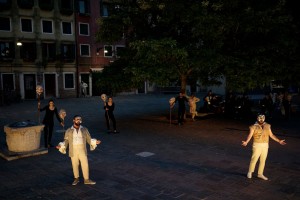VENICE AND THE GHETTO Shylock Slips out of his Skin
We know that it is practically impossible to have an innocent and unbiased reading of Shakespeare’s The Merchant of Venice today. Indeed this is what makes this work so versatile for contemporary adaptations. More than in easily identifiable cuts or added scenes, the challenge must be sought in the intentions of the lines uttered by every single character, the words spoken by the actor, the ideas expressed to the listening audiences. That is to say: the play as a whole, with its combination of words, music, lights and movement that Compagnia de Colombari has created for its audiences in the Ghetto of Venice.
Seeking to bring the Merchant the most relevance means making it immediately credible in the digital age: the era of genre crossovers, of the daily mortification of expressive speech. This means that the effervescence of Shakespeare’s writing and the specificity of his sound must survive hostile surroundings today. Helping the play survive requires a great deal of patience, an overall dramatic pace that is both careful and meticulous, made of text and sub-text, quotes and linguistic micro-betrayals. There is little choice. It must find an acceptable mediation with today’s universe of “seeing” rather than that of “listening”. Today’s visual civilization entails the globalization of millions of images produced hourly on the streets, multiplied by non-stop digital bombardment.
More than ever before, staging The Merchant of Venice today means starting from an extraordinarily well-written text meant for an audience of listeners and transposing it for today’s audiences of spectators. This masterpiece was registered at London’s Stationer’s Register in July 1598 to prevent pirated copies from being published.
Many other uncertainties, hopes and good intentions must be added to this initial obstacle and have dogged us as we tried to explain to ourselves and to others ‘how’ and ‘why’ this play, which was associated with the character of Shylock and its mythology right from the start, is still capable of fully catching our attention. That’s why from the very beginning we insisted that it be radically changed. We felt an almost ‘natural’ duty to commit dramaturgical heresy, to transfer Shylock into the body of five actors, make him slip out of his single, unique skin to underscore how each one of us is indeed Shylock. This emblematically unhappy character, whose dignity was expropriated, who was persecuted and excluded, cuts across all genders and religious creeds. He’s terribly complex and fascinating, a blessing and a curse for any spectator and dramaturg. He’s unbearable in his initial lines, when turning directly to the audience he states:
“I hate him for he is a Christian, but more for that in low simplicity he lends out money gratis and brings down the rate of usance here with us in Venice.” But then his words are heart-wrenching, when he reminds his callous persecutors, “Hath not a Jew eyes? hath not a Jew hands, organs, dimensions, senses, affections, passions?” Even today, beyond his painful, personal story, Shylock asks us and himself to be considered a victim. He’s no longer the theatrical transposition of the offensive, anti-Semitic iconography that originated in the Christian world with the 1320 Narratio legendaria, but rather the universal, painful precipitate of existence in a society dominated only by commerce, money and its power. More than an episode of cruelty on the stage, it is the true act of intolerance and fraudulence against oneself and others. And in so doing, it hits the eye of our times with great precision.
*Walter Valeri is a dramaturg. The article was translated by Pina Piccolo and was published in the booklet by Ca’ Foscari University of Venice, Compagnia de’ Colombari and Committee for the 500 years of the Ghetto on the occasion of the new production of “The Merchant of Venice” performed for the first time in the Ghetto.

